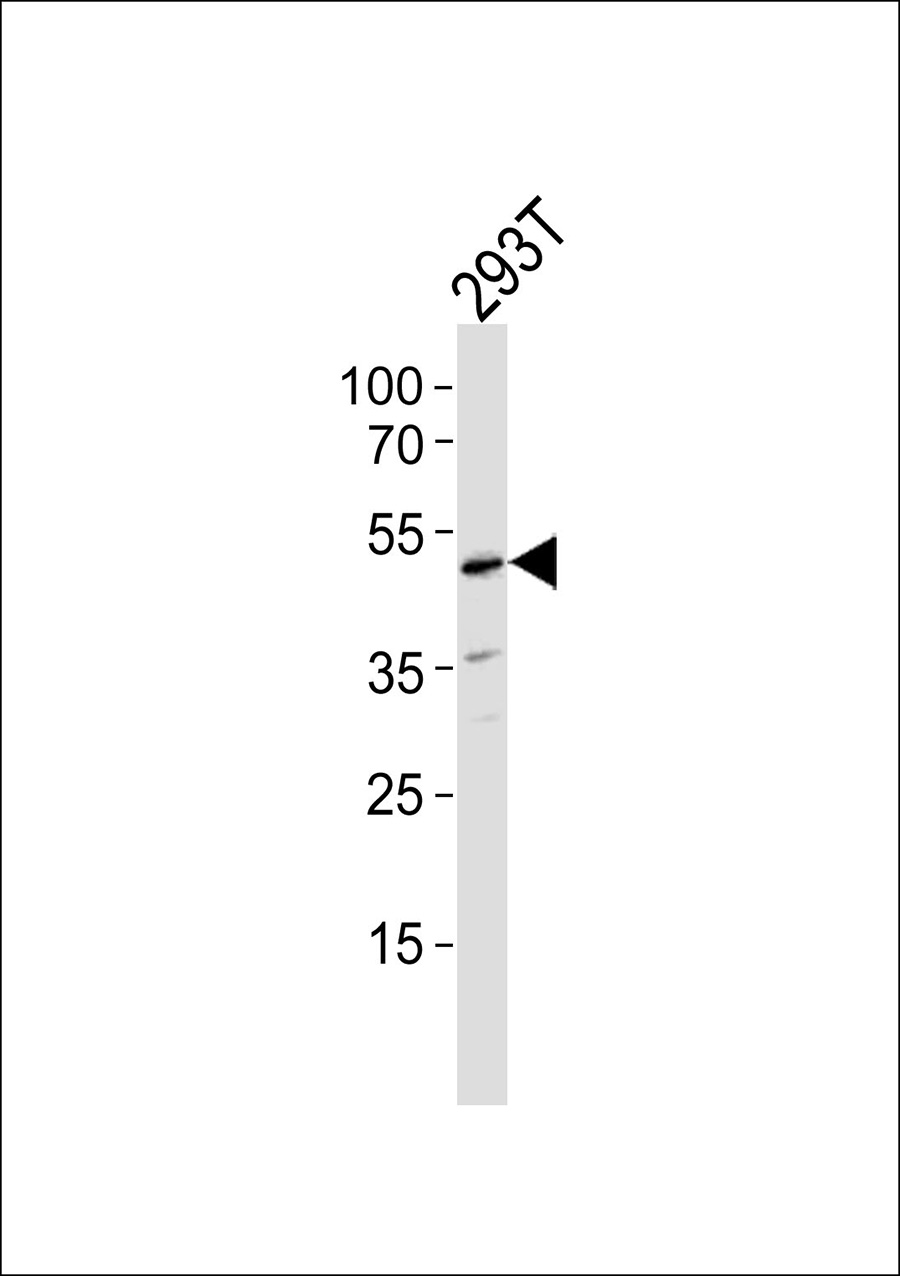CDK5RAP3 Antibody
Purified Rabbit Polyclonal Antibody (Pab)
- 产品详情
- 实验流程
- 背景知识
Application
| WB |
|---|---|
| Primary Accession | Q96JB5 |
| Reactivity | Human, Mouse, Rat |
| Host | Rabbit |
| Clonality | polyclonal |
| Calculated MW | 56921 Da |
| Gene ID | 80279 |
|---|---|
| Other Names | CDK5 regulatory subunit-associated protein 3, CDK5 activator-binding protein C53, Protein HSF-27, CDK5RAP3, IC53 |
| Dilution | WB~~1:500 |
| Format | Rabbit IgG in phosphate buffered saline (without Mg2+ and Ca2+), pH 7.4, 150mM NaCl, 0.09% (W/V) sodium azide and 50% glycerol. |
| Storage Conditions | -20℃ |
| Name | CDK5RAP3 {ECO:0000303|PubMed:30635284, ECO:0000312|HGNC:HGNC:18673} |
|---|---|
| Function | Substrate adapter of E3 ligase complexes mediating ufmylation, the covalent attachment of the ubiquitin-like modifier UFM1 to substrate proteins, and which is involved in various processes, such as ribosome recycling and reticulophagy (also called ER-phagy) (PubMed:23152784, PubMed:30635284, PubMed:32851973, PubMed:36121123, PubMed:36543799, PubMed:37595036, PubMed:38383785, PubMed:38383789). As part of the UREL complex, plays a key role in ribosome recycling by promoting mono-ufmylation of RPL26/uL24 subunit of the 60S ribosome (PubMed:38383785, PubMed:38383789). Ufmylation of RPL26/uL24 occurs on free 60S ribosomes following ribosome dissociation: it weakens the junction between post-termination 60S subunits and SEC61 translocons, promoting release and recycling of the large ribosomal subunit from the endoplasmic reticulum membrane (PubMed:38383785, PubMed:38383789). Ufmylation of RPL26/uL24 and subsequent 60S ribosome recycling either take place after normal termination of translation or after ribosome stalling during cotranslational translocation at the endoplasmic reticulum (PubMed:32851973, PubMed:37595036, PubMed:38383785, PubMed:38383789). Within the UREL complex, CDK5RAP3 acts as a substrate adapter that constrains UFL1 ligase activity to mono-ufmylate RPL26/uL24 at 'Lys-134' (PubMed:36121123, PubMed:38383785, PubMed:38383789). The UREL complex is also involved in reticulophagy in response to endoplasmic reticulum stress by promoting ufmylation of proteins such as CYB5R3, thereby promoting lysosomal degradation of ufmylated proteins (PubMed:36543799). Also acts as a regulator of transcription: negatively regulates NF-kappa-B-mediated gene transcription through the control of RELA phosphorylation (PubMed:17785205, PubMed:20228063). Also regulates mitotic G2/M transition checkpoint and mitotic G2 DNA damage checkpoint (PubMed:15790566, PubMed:19223857). Through its interaction with CDKN2A/ARF and MDM2 may induce MDM2-dependent p53/TP53 ubiquitination, stabilization and activation in the nucleus, thereby promoting G1 cell cycle arrest and inhibition of cell proliferation (PubMed:16173922). May also play a role in the rupture of the nuclear envelope during apoptosis (PubMed:23478299). May regulate MAPK14 activity by regulating its dephosphorylation by PPM1D/WIP1 (PubMed:21283629). Required for liver development (By similarity). |
| Cellular Location | Endoplasmic reticulum membrane. Cytoplasm. Nucleus. Cytoplasm, cytoskeleton, microtubule organizing center, centrosome. Cytoplasm, cytoskeleton. Note=Tethered to the endoplasmic reticulum membrane as part of the UFM1 ribosome E3 ligase (UREL) complex (PubMed:38383785, PubMed:38383789). Colocalizes and associates with microtubules (PubMed:23478299) |
| Tissue Location | Ubiquitously expressed (PubMed:10721722, PubMed:12054757). Expressed in heart, brain, placenta, lung, liver, skeletal muscle, kidney and pancreas. Isoform 3 is expressed in kidney, liver, skeletal muscle and placenta (PubMed:12737517) |
For Research Use Only. Not For Use In Diagnostic Procedures.
Provided below are standard protocols that you may find useful for product applications.
BACKGROUND
Potential regulator of CDK5 activity. May be involved in cell proliferation. Regulates CDK5 activity via its interaction with CDK5R1 (By similarity).
REFERENCES
Chen J.,et al.Biochem. Biophys. Res. Commun. 294:161-166(2002).
Xie Y.H.,et al.Cell Res. 13:83-91(2003).
Favier A.-L.,et al.Submitted (JAN-2001) to the EMBL/GenBank/DDBJ databases.
Shichijo S.,et al.Submitted (MAY-2001) to the EMBL/GenBank/DDBJ databases.
Ota T.,et al.Nat. Genet. 36:40-45(2004).
终于等到您。ABCEPTA(百远生物)抗体产品。
点击下方“我要评价 ”按钮提交您的反馈信息,您的反馈和评价是我们最宝贵的财富之一,
我们将在1-3个工作日内处理您的反馈信息。
如有疑问,联系:0512-88856768 tech-china@abcepta.com.























 癌症的基本特征包括细胞增殖、血管生成、迁移、凋亡逃避机制和细胞永生等。找到癌症发生过程中这些通路的关键标记物和对应的抗体用于检测至关重要。
癌症的基本特征包括细胞增殖、血管生成、迁移、凋亡逃避机制和细胞永生等。找到癌症发生过程中这些通路的关键标记物和对应的抗体用于检测至关重要。 为您推荐一个泛素化位点预测神器——泛素化分析工具,可以为您的蛋白的泛素化位点作出预测和评分。
为您推荐一个泛素化位点预测神器——泛素化分析工具,可以为您的蛋白的泛素化位点作出预测和评分。 细胞自噬受体图形绘图工具为你的蛋白的细胞受体结合位点作出预测和评分,识别结合到自噬通路中的蛋白是非常重要的,便于让我们理解自噬在正常生理、病理过程中的作用,如发育、细胞分化、神经退化性疾病、压力条件下、感染和癌症。
细胞自噬受体图形绘图工具为你的蛋白的细胞受体结合位点作出预测和评分,识别结合到自噬通路中的蛋白是非常重要的,便于让我们理解自噬在正常生理、病理过程中的作用,如发育、细胞分化、神经退化性疾病、压力条件下、感染和癌症。






